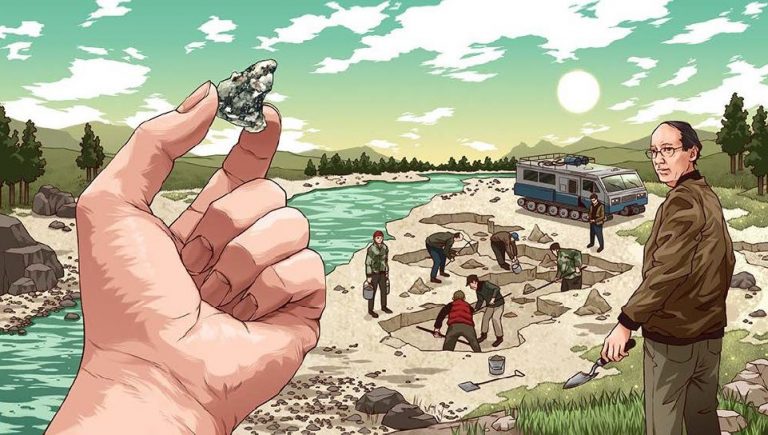Natural Quasicrystals
The publications below all relate to the successful search for the first natural quasicrystals, beginning with icosahedrite and including two other quasicrystal phases and several new minerals, all discovered in remnant of a meteorite that formed billions of years ago. The story of quasicrystals (from the founding of the concept to the discovery of the first natural quasicrystals) is described in The Second Kind of Impossible (2019).

INTRODUCTION TO NATURAL QUASICRYSTALS
P.J. Steinhardt
Quasicrystals: a brief history of the impossible
Rend. Fis Acc. Lincei. (2012) 092601
And
P.J. Steinhardt and L. Bindi
In search of natural quasicrystals
Rep. on Prog. Phys. 75 (2012) 092601
Reviews of the first dozen years of the search for natural quasicrystals.
L. Bindi, V.E, Dimitrienko and P.J. Steinhardt
Are quasicrystals really so rare in the Universe?
Outlooks in Earth and Planetary Materials, Am. Min. 105, (2020) 1121
Speculations about future searches
See also:
Why quasicrystals shouldn’t exist but are turning up in strange places, New Scientist (2025)
In a Grain, a Glimpse of the Cosmos, Quanta Magazine (2014)
Rock from a hard place, New Scientist (2014)
Facts and FAQS about natural quasicrystals and other minerals discovered in the Khatrya meteorite
DISCOVERY OF THE FIRST NATURAL QUASICRYSTAL (ICOSAHEDRITE)
P.J. Lu, P.J. Steinhardt, K. Deffeyes, N. Yao
Identifying and Indexing Icosahedral Quasicrystals from Powder Diffraction Patterns
Phys. Rev. Lett. 87 (2001) 275507
The systematic search for a natural quasicrystal begins
L. Bindi, P.J. Steinhardt, N. Yao, P.J. Lu
Natural Quasicrystals
Science 324 (2009) 1306
The discovery of the first natural quasicrystal
L. Bindi, P.J. Steinhardt, N. Yao, P.J. Lu
Icosahedrite, Al63Cu24Fe13, the first natural quasicrystal
Am. Mineralogist 96 (2011) 928
Official recognition and naming by the International Mineralogical Association of the first natural quasicrystal
L. Bindi, J. Eiler, Y. Guan, L.S.Hollister, G. MacPherson, P.J. Steinhardt, N. Yao
Evidence for the extraterrestrial origin of a natural quasicrystal
PNAS 109 (2012) 1396
First evidence that natural quasicrystals are extraterrestrials – remnants of a meteorite
L. Bindi, P.J. Steinhardt
The discovery of the first natural quasicrystal: A new era for mineralogy?
PNAS 109 (2012) 1396
DISCOVERY OF MORE NATURAL QUASICRYSTALS (DECAGONITE & I-PHASE II)
L. Bindi, N.Yao, C. Lin, L.S. Hollister, C.L. Andronidcos, V.V. Distler, M.P. Eddy, A. Kostin, V. Kryachko, G.J. MacPherson, W.M. Steinhardt, M. Yudovskaya, P.J. Steinhardt
Natural quasicrystal with decagonal symmetry
Sci. Reports 5 (2015) 9111 and Am. Mineralogist 100 (2015) 2340
The discovery of the second natural quasicrystal and the first natural quasicrystal with decagonal symmetry
L. Bindi, C. Lin, C. Ma, P.J. Steinhardt
Collisions in outer space produced an icosahedral phase in the Khatyrka meteorite never observed previously in the laboratory
Sci. Reports 6 (2016) 38117
The discovery of the third natural quasicrystal, unofficially named i-phase II, an aluminum-copper-iron mixture with icosahedral symmetry that formed during a high velocity collision
RESEARCH ON THE ORIGIN OF NATURAL QUASICRYSTALS
G.J. MacPherson, C.L. Andronicos, L. Bindi, V.V. Distler, M.P. Eddy, J.M. Eiler, Y. Guan, L.S. Hollister, A. Kostin, V. Kryachko, W.M. Steinhardt, M. Yudovskaya, P.J. Steinhardt
Khatyrka, a new CV3 find from the Koryak Mountains, Eastern Russia
Meteoritics & Planetary Science, 48 (2013) 1499
Official recognition of the discovery of the Khatyrka meteorite, the source of the first-recognized natural quasicrystals
L.S. Hollister, L. Bindi, N. Yao, G.R. Poirier, C.L. Andronicos, G.J. MacPherson, C. Lin, V.V. Distler, M.P. Eddy, A. Kostin, V. Kryachko, W.M. Steinhardt, M. Yudovskaya, J.M. Eiler, Y. Guan, J.J. Clarke, P.J. Steinhardt
Impact-induced shock and the formation of natural quasicrystals in the early solar system
Nat. Comm. 5 (2014) 4040
First evidence that the Khatyrka meteorite underwent a high-velocity impact and implications for quasicrystal formation
P.D. Asimow, C. Lin, L. Bindi, C. Ma, O. Tschauner, L.S. Hollister, P.J. Steinhardt
Shock synthesis of quasicrystals with implications for their origin in asteroid collisions
PNAS, 113 (2016) 7077
and
J. Oppenheim, C. Ma., J. Hu, L. Bindi, P.J. Steinhardt and P.D. Asimow
Shock Synthesis of Decagonal Quasicrystals
PNAS, 113 (2016) 7077
Laboratory simulations of high-velocity collisions lead to the shock synthesis of quasicrystals and other novel phases
C. Lin, L.S. Hollister, P.J. Steinhardt, G.J. MacPherson, L. Bindi, C. Ma, C.L. Andronicos, P.J. Steinhardt
Impact-induced shock and the formation of natural quasicrystals in the early solar system
Sci. Reports, 7 (2017) 1637
Tracing the chemical reactions that created the first natural quasicrystals in space
M.M.M. Meir, L. Bindi, P.R. Heck, A.I. Neander, N.H. Spring, M.E.I. Riebe, C. Madin, H. Baur, P.J. Steinhardt, R. Wieler, H. Busemann
Cosmic history and a candidate parent asteroid for the quasicrystal-bearing meteorite Khatyrka
Earth & Planetary Science Letters, 490 (2018) 122
Analysis of noble gases reveals the history of the Khatyrka meteorite including the identification of a potential parent asteroid
S. Tommasini, L. Bindi, M. Petrelli, P. D. Asimow, P.J. Steinhardt,
Trace element conundrum of natural quasicrystals, A. Chem. S. Earth Space Chem. (2021)
We report measurements of the trace element contents of the two naturally occurring quasicrystalline minerals from the Khatyrka meteorite, icosahedrite and decagonite. On this basis of these and earlier results, we construct a three-stage model for the formation of the quasicrystals and their inclusions
See also another mineral phase discovered in Khatyrka: Steinhardtite
For related research on islamic tilings, go here

